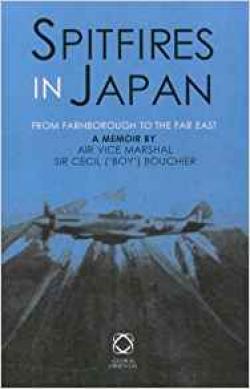Spitfires in Japan: From Farnborough to the Far East: A Memoir

Edited by Dorothy Britton (Lady Bouchier)
Global Oriental, 2005
ISBN 1-901903-44-3
Review by Ian Nish
This interesting book can be looked at from many different perspectives. Basically it is the autobiography of a serviceman, Cecil 'Boy' Bouchier (1895-1979) who, despite setbacks and disappointments, worked his way through the ranks to positions of power and prestige in the Royal Air Force. At another level it is a history of the RAF as a fighting force in the UK and the British Empire. It is therefore a commentary on the military history of Britain in the first half of the twentieth century.
The early chapters deal with Boucher's background, education and service during the first world war in the Honourable Artillery Company in the middle east. He then switched to the Royal Flying Corps, initially in Cairo. The story then turns to a blossoming career in the RAF, much of which in the 1930s concerns postings in India. Inevitably its terminology is redolent of a former age, almost Kiplingesque : gharis, solar topis, tongas, shikar, chaukidar, for example. But it was a time when Bouchier grew in confidence and we find him in the 1930s training Indian pilots, both Hindus and Muslims, to serve in the embryo Indian Air Force.
His life-story hitherto had been a preparation for the war of 1939-45. He had become acquainted with Spitfires prewar and it was natural that he should command the station at Hornchurch, on the Thames east of London, during the Battle of Britain. In 1944 he drew up the Fighter Air Cover Plan to cover the troop landings in Normandy as part of the allied continental invasion. He was also involved in defence against the attacks on London by V-I and V-II bombs in 1944-5. Bouchier had 'a good war.' Despite all the unpleasantness in the upper reaches of the RAF establishment (which are fully chronicled), he survived and enhanced his reputation.
For the historian the last forty pages of the book are of special significance. When the war in Europe ended, Bouchier became Air Vice-Marshal with command in Burma in time to take the Japanese surrender. He then served briefly in Indonesia and finally in the British Commonwealth Air Force (BCAIR) in Japan. He established a base at Miho on the Japan Sea coast where he operated squadrons of Spitfires. Hence the title of this work. At times he acted as commander in chief of the British Commonwealth Occupation Force (BCOF) itself. He stayed in Japan till 1948 when he retired from the service.
After a brief career with the Confederation of British Industries (CBI), he was called back to duty in the summer of 1950 after the start of the Korean War. His role was to act as go-between between General Douglas MacArthur as Supreme Commander Allied Powers (SCAP) and the British Chiefs of Staff. Told by the latter not to commit Britain to sending any British troops to Korea, Bouchier in one of the major revelations of this book visited the front, surveying the Pusan Bridgehead where the allied troops were engulfed, and strongly recommended that a British force should be sent, possibly a brigade from Hongkong. In London the Labour government after weighing advice from many quarters agreed. This is clearly a point of great historical interest and specialists will wish to compare Bouchier's account with that given by General Sir Anthony Farrar-Hockley in the official history of British participation in Korea. But clearly the account left by a first-hand participant like Bouchier who had the temerity to make recommendations contrary to his instructions adds detail and colour to the hitherto published accounts (p.301).
During the active phase of the Korean War Bouchier seems to have played an influential role as a channel of communication with MacArthur and his successors in Tokyo and, by dint of travelling frequently to Korea itself, to have liaised usefully with the troops there and their commanders. The war dragged on and in November 1952 Bouchier asked to be recalled after "two-and-a half years without a break" (p.330).
This life-story ends on a high note with a meeting with Winston Churchill who had returned to power as prime minister in 1951. Churchill saw Bouchier's daily reports from Tokyo to the Chiefs of Staff and apparently wrote "I like Bouchier's stuff." He was shown special courtesy when he went as special guest to Sunday lunch at Chequers on 18 November 1952. Bouchier praises the "incredible warmth and kindness of Churchill" (p.338) as he had earlier praised the qualities of MacArthur with whom he had a specially cordial relationship.
This volume presents us with a story of a kind which we are not likely to see again after the end of empire. It was a life made possible by the growing sophistication of aircraft and the mobility that it gave to commanders like Bouchier. His career had its high points but this was combined with personal tragedies. The sheer isolation of a service career and the considerable sacrifices entailed in separation from family in war and peace were things that only a strong and optimistic temperament like Bouchier's could bear. This straightforward and attractively expressed memoir is accompanied by 35 illustrations which capture the many aspects of a variegated career.
The review was published in Japan Book Review Volume 1 No. 1 (January 2006), pp. 3-4

